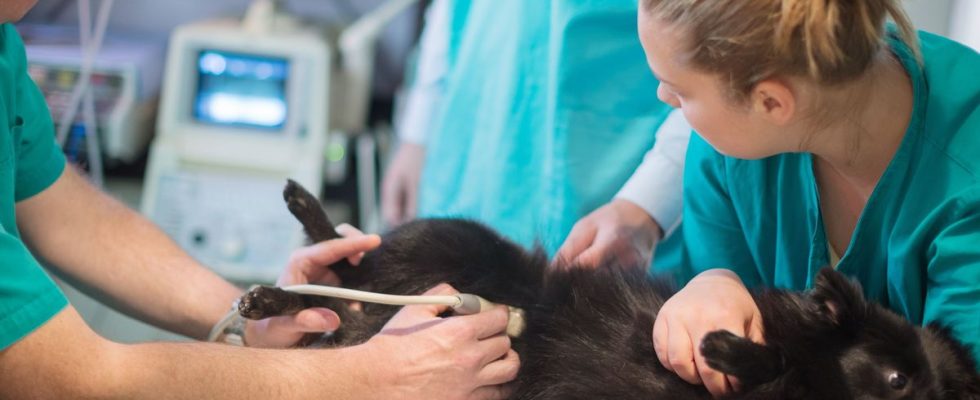Very recently, our Strasbourg colleague Thibaut Gagnepain interviewed emergency veterinarian Pierre Fabing, author of the book You called the vet, which has just been released by Albin Michel editions. In this interview given to 20 minutesthe doctor confides: “We are often told that we do “the best job in the world” […] but I would add that we are also confronted with death, that we give it frequently. And in the emergencies, there is an emotional part, a stress, without forgetting an increasing requirement on the part of the owners. We are the healthcare profession with the highest suicide rate. »
Veterinarians, the health profession with the highest risk of suicide? This passage challenged us, and we wanted to know more. The first study on the psychological health of the profession was published in May 2022. Carried out by Didier Truchot, professor of social psychology at the University of Franche-Comté, on 3,244 French veterinarians, it indeed points to a suicide rate of “three four times higher” in this occupation than in the general population. In addition, veterinarians have “twice the risk of suicide as human health professions”. The figures are therefore alarming: 4.7% of the professionals questioned declared having already attempted suicide, 4.8% having had “fairly often”, “frequently” or “always” the desire to commit suicide in the weeks following preceded the survey, and 18.4% had this desire “occasionally”.
A work overload
“In the profession, we all have around us a colleague or a former classmate who committed suicide”, confirms Corinne Bisbarre, head of the social commission of the Order of Veterinarians, institution at the origin of this study. . Several factors explain this. “The pressure at work is sometimes extremely high due to the chronic shortage of veterinarians”, analyzes Edith Graff, veterinary doctor and member of the administrative board of the Vétos-Entraide association. Within the association which provides help, particularly psychological, to veterinarians and their relatives, the doctor receives many testimonials from exhausted colleagues. But burnout, like the Depressionare predisposing factors for suicide.
In rural areas, the obligation of permanence and continuation of care would also affect the fatigue of veterinarians. Several times a week, during their shifts, “they have to answer calls and get up at night,” explains the member of Vétos-Entraide. If they don’t, they find themselves at fault. Like doctors, veterinarians are not immune to rural desertification. Some, having seen their colleagues retire or move to larger cities, are forced to travel a considerable number of kilometers to visit animal owners.
Incivility and aggression on the rise
However, Didier Truchot’s study shows that the professionals most at risk are those working in urban areas. No wonder according to Corinne Bisbarre. The annual reports of the Observatory of Aggressions and Incivilities suffered by practicing veterinarians show a number and severity of incivilities that have been rising steadily for several years. In 2021, they rose by 10.5%. And it is in the largest agglomerations that these figures are the highest. “Customers are threatening to break everything or come and set fire to it,” explains Corinne Bisbarre, head of this Observatory. Some veterinarians even receive death or rape threats. »
David Quint, veterinary doctor and vice-president of the National Union of Veterinarians of Liberal Exercise (SNVEL), confirms: “The requirements of animal owners are more and more important. And the reviews on Google didn’t help the situation. “A colleague went into deep depression after several negative reviews of her. She committed suicide at her workplace a few weeks ago,” says the veterinarian. Remember, however, that killing oneself is multifactorial, and professional conditions are rarely the only factor involved.
The daily confrontation with the illness and death of animals, as well as the pain of the owners, can also, in the long run, affect mental health. “Sometimes, some people do not have the means to have their animal treated up to what could be done,” explains David Quint. And it’s hard to accept being forced to see the animal die because you don’t have the means. Euthanasia is in particular a psychologically difficult act, for which veterinarians are, according to the vice-president of SNVEL, ill-prepared.
Professionals addicted to their work
Explanations could also be found in the very identity of the profession. The feminization of the profession would, for example, have a role. Since women are responsible for the majority of household chores as well as the health and education of children, “they mobilize a large part of their energy in their family sphere and can no longer find the energy to resist professional pressure because the two is a lot”, sums up Corinne Bisbarre.
The profile of veterinarians would also make it possible to understand this high risk of burnout and suicidal thoughts. “From veterinary school, we are selected on our great capacity for work, considers Corinne Bisbarre. We select people addicted to work. The veterinarians therefore work a lot, with pleasure, without realizing that they are putting their finger in a gear. In his study, Didier Truchot notes that more than a third (37%) are workaholics, that is to say that they maintain “a relationship of psychological dependence” vis-à-vis their profession.
However, the professionals interviewed are keen to qualify this negative image. “Since the publication of this study, we only see veterinarians through this prism, while the majority remain happy to work”, assures the head of the social commission of the Order of Veterinarians. Some who have burnt out or have had suicidal thoughts are happy to come back to work and find a lot of fulfillment factors there. It’s not just pain. »

